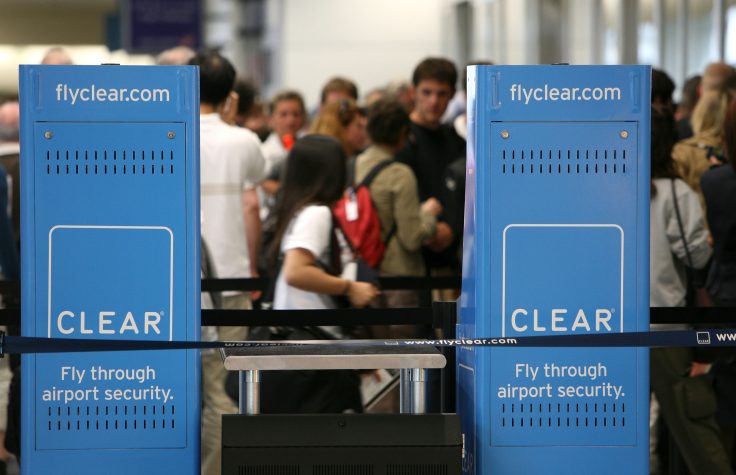Congress is poised to hand over control of sensitive airport screening information to private companies, an unprecedented move that would limit the federal government’s control of passenger information and inspection.
The Senate is considering the Registered Traveler Act of 2020, which would entrust private airport screening companies such as Clear to assume control of security procedures that have traditionally been handled by the Department of Homeland Security and the Transportation Security Administration. These privately owned companies would gain access to TSA databases containing passenger information and other data about individuals who may pose a national security risk. Currently, private companies are not permitted to access this government data. If passed, the legislation would give Clear and other private companies more power than the TSA itself by allowing its customers to skip lines and critical screening steps.
The legislation has been fast-tracked in Congress thanks to lobbying campaigns from companies, including Clear, that hope to expand their footprint in airports by independently handling security screening. The bipartisan legislation is on track for Senate markup in the coming weeks, which will pave the way for a full vote on the measure.
Critics of the proposal, including the TSA and its unions, maintain that private companies are not equipped to handle sensitive passenger information and the screening of potential security risks, such as those on the terrorist watch list. The bill would hand over control of DHS’s Secure Flight database and Travel Document Checker to private companies that seek to quicken the pace of airport security lines for high-paying customers. Such a move could jeopardize security and put sensitive information at risk. Supporters of the bill see it as a vehicle to increase airport efficiency and limit the role played by TSA, which has been plagued by personnel problems and repeatedly cited by the government for failing to adequately carry out its security function.
Clear, one of the leading private providers of express airport check-in, is poised to benefit the most from the proposed legislation. It has waged an aggressive lobbying campaign to see the legislation passed using high-profile consultants like Jeh Johnson, secretary of homeland security during the Obama administration, and Peter Neffenger, TSA administrator during the Obama administration. United and Delta airlines own a minority stake in Clear.
Clear said the Registered Traveler Act is necessary so it can continue to function in conjunction with TSA.
"Registered Traveler providers such as CLEAR have successfully verified identity and directed passengers to appropriate physical screening over 50 million times since 2010," a Clear spokesperson said. "As technology evolves and the capabilities of TSA change, this legislation will ensure that Registered Traveler partners are able to continue to fulfill their roles. The Registered Traveler Act would not change the security process and all traveler vetting assessments, determinations and physical screenings would remain with TSA - where they belong."
Clear’s track record with sensitive information has been questioned by some in Congress.
In late May, Sens. Jeff Merkley (D., Ore.) and Cory Booker (D., N.J.) probed the company over its Health Pass service, which allows paying customers to verify their identity and health status by taking selfies and answering questions about possible exposure to the coronavirus.
The senators expressed concerns at the time about the company’s ability to keep this information secure as rogue regimes such as China, Iran, and Russia increase their cyber-espionage efforts in America. Information of this nature "poses real privacy concerns" and can be "utilized widely and passively in such a way that eludes consumers’ awareness, permission, or the ability to opt out," according to the lawmakers.
Similar concerns are being raised about the private sector’s ability to handle sensitive airport security information.
Trump administration TSA administrator David Pekoske urged in late December the Senate’s Committee of Appropriations, which is handling the Registered Traveler Act, to reject the bill on the grounds that it would "interfere with the agency's ability to perform its core security functions."
Companies such as Clear do not perform the same rigorous screening procedures used by the TSA, according to Pekoske, and do not currently have a contractual relationship with the agency, which would provide oversight on the company.
"Secure Flight handles personal private information about American citizens who are traveling, and access to that person-specific information should be granted only for reasons related to Secure Flight's mission, not to benefit a private company," Pekoske wrote.
In late May, union groups affiliated with the TSA issued similar letters to Congress warning against the legislation. These letters were sent by the American Federation of Government Employees and the AFL-CIO’s Transportation Trades Division.
The bill’s supporters, which include the U.S. Chamber of Commerce, argue it is vital for the government to leverage the private sector’s tech know-how, particularly in light of the coronavirus pandemic. With TSA consistently overburdened by crowds and facing its own struggles with security screening, Clear and other companies can help relieve the burden and ultimately expedite complicated security procedures.
"We can help improve the efficiency of airport security and enable passengers to navigate security with less human contact and fewer crowds, which is more important than ever in the wake of the coronavirus pandemic," Sen. Todd Young (R., Ind.), who helped spearhead the bill, said in a recent statement.
Update July 14, 2:01 p.m.: This post has been updated with comment from Clear.
